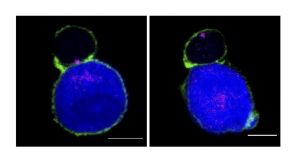La SNX27 regula la sinapsis neuronal pero también participa en la sinapsis inmune -un proceso necesario para la activación de los linfocitos y que determina la intensidad de la respuesta inmune producida- limitando la activación de vías proinflamatorias. “Nuestro objetivo, continua Mérida, es estudiar el papel de SNX27 en la homeostasis de los linfocitos T. Por este motivo, nos decantamos por generar una nueva línea de ratones transgénicos solo en este linaje celular. Así aseguramos que los resultados son producto de la falta de SNX27 en este sistema y no están distorsionados por la falta de esta proteína en otros sistemas celulares.”
Cristina Rodríguez, una de las primeras autoras del trabajo y también investigadora en el CNB/CSIC con financiación de la Fundación Jerome Lejeune/Álvaro Entrecanales, describe sus resultados: “en estos ratones existe un marcado déficit de linfocitos T CD4+ que presentan, además, defectos en la organización de la sinapsis inmune. Además, los análisis de poblaciones CD8+ indican un fenotipo más inflamatorio, un rasgo distintivo del envejecimiento en ratones, pero también en humanos.”. “Nuestro estudio demuestra que la pérdida parcial de SNX27 tiene un claro efecto en las funciones de las células T y sugieren que su desregulación podría contribuir a las alteraciones inmunitarias y envejecimiento prematuro asociadas al síndrome de Down”, concluye Rodríguez.
Envejecimiento y mayor susceptibilidad inmunológica
El envejecimiento se caracteriza por un declive progresivo de funciones fisiológicas, como las capacidades cognitivas y la respuesta inmunitaria. Los defectos en la respuesta inmunitaria adaptativa incluyen una menor capacidad a los antígenos y la pérdida de poblaciones de células T que suelen asociarse a un bajo grado de inflamación crónica relacionado con el envejecimiento. El síndrome de Down presenta muchas características de un envejecimiento prematuro tanto a nivel cognitivo como del sistema inmune que se traduce en una mayor susceptibilidad a las infecciones bacterianas, hemopatías malignas y trastornos autoinmunes. “Conocer mejor la contribución de la SNX27 en el control de la comunicación celular en nuestro cuerpo, tanto en la sinapsis neuronal, como en la sinapsis inmune podría esclarecer cuales son los factores moleculares que determinan las características del síndrome de Down y su contribución al envejecimiento” comenta Natalia González, también co-autora en esta investigación gracias a la financiación por la Fundación La Caixa.
Más información
Cristina Rodríguez‑Rodríguez, Natalia González‑Mancha, Ane Ochoa‑Echeverría, Rosa Liébana, Isabel Mérida. Partial loss of Sorting Nexin 27 resembles age‑ and Down syndrome‑associated T cell dysfunctions. Immunity & Ageing 2024, 21:2 doi: https://doi.org/10.1186/s12979-023-00402-3






